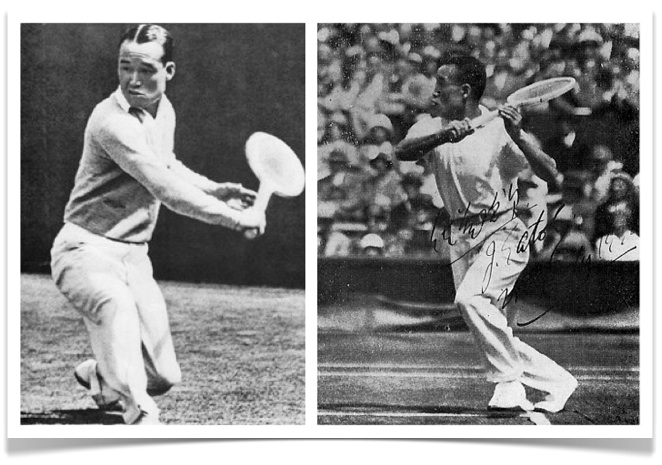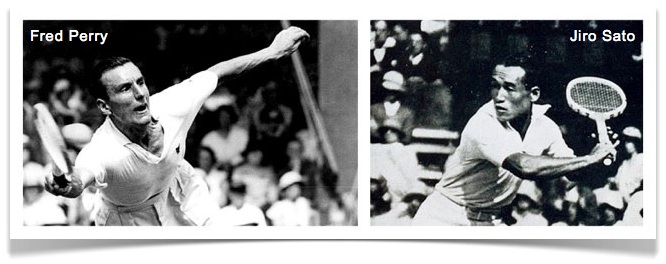2013年02月11日09:43

There have been some news stories recently about punishment style coaching techniques used in sports.
最近スポーツ界で行われている体罰についてのニュースがよく流れている。
These stories have indirectly reminded me of the tragic case of almost forgotten Japanese tennis star Jiro Sato.
体罰のニュースを聞くたびにほとんど忘れ去られている日本のテニス界のスター佐藤次郎を思い出す。
Sato was a born in Gunma Prefecture in 1908.
佐藤は1908年に群馬県で生まれた。
He attended prestigious Waseda University before dropping out to pursue tennis professionally.
プロテニスの道をドロップアウトする以前には、名門早稲田大学に在籍していた。
After a very impressive debut against some visiting professional French tennis players in 1929, Jiro Sato became a force on the international tennis scene.
1929年のフランスの招待プロテニス選手を打ち負かすという衝撃的なデビューの後、佐藤次郎は国際的なテニスの大会で活躍した。
He was a natural.
彼は天才だった。
Sato won or finished very highly in numerous international tennis tournaments including the Davis Cup.
デビスカップを含む数々の国際的な試合で優勝または良い成績を残した。
In 1932 he reached the Wimbledon semifinals by beating defending champion Sidney Wood in the quarter finals.
1932年には、前回の優勝者シドニーウッドを準々決勝で打ち破り、ウィンブルドンで準決勝に出場した。
In 1933, he reached his peak with a world tennis ranking of No. 3 after beating the legendary Fred Perry in the French Open.
1933年には伝説のテニスプレーヤーフレッドペリーをフランスオープンで打ち負かし彼のテニスランキングは世界3位となった。
Jiro Sato was clearly the best Japanese tennis player ever and one of the great players in early tennis history.
佐藤次郎は、今までで最高のテニスプレーヤであり、歴史上で偉大なテニス選手の一人だ。
So why is he almost forgotten?
だから、どうして彼はほとんど忘れ去られているのか。
I think it might have to do with the tragic ending to his impressive career and life.
彼にこの輝かしいキャリアと人生に悲劇的な結末を迎えなければならなかったからかもしれない。
He committed suicide at 26 years old.
彼は、26歳で自殺した。
En route by ship to a Davis Cup match in Europe, he tied weights around his ankles and threw himself overboard into the ocean near Malaysia.
ヨーロッパでのデビスカップへ向かう船の途中で、彼は足におもりをつけマレーシア近くの海へ投身自殺した。
He left two suicide notes, both apologizing for his actions and any inconveniences they caused.
彼は2つの遺書を残した。自分が自殺することそれによって迷惑をかけることへの謝罪が綴られていた。
Jiro was suffering a lot of stress as a result of the burden of his success and the hectic lifestyle of professional tennis.
次郎は成功への重みと多忙なプロテニス生活のストレスに苦しんでいた。
He wanted to take a break.
彼は休みを取りたがっていた。
However, the Japanese Lawn Tennis Association and Japanese government officials were pressuring him to carry on.
しかしながら、日本庭球協会と日本政府はそのことを許さなかった。
It seems that the stress of being a 'national hero' and playing for the 'honor of Japan' was making the exhausted Jiro Sato depressed.
国民的ヒーローであること、日本の誇りとしてプレーすることは疲れ果てた佐藤次郎を追い込んだ。
When his request to withdraw from Davis Cup matches in Europe was denied, he must have felt no way out.
デビスカップへの出場を辞退したいという申し出が断られた時、彼はうつ病になるほど追い込まれた。
While the story of Jiro Sato is not about corporal punishment, it is a story about the effects of coercion on people.
佐藤次郎の話は体罰に関することではないけど、誰かに無理強いさせられることへの問題の話だ。
Punishment based training systems create a climate of fear and duress, using physical intimidation to provoke an athlete to preform better.
体罰を加えることで選手によりよい動きをさせることは、恐怖と脅迫の風潮を生み出す。
Unfortunately, the negative side effects of corporal punishment are enormous.
残念ながら体罰の負の副作用は甚大である。
They included the possible lowering of self-esteem and the creation of hostility and rage issues.
自尊心を低下させ、敵意と怒りを生み出す。
There is also no guarantee that it will actually improve performance.
しかも技術がよくなる保証もない。
Jiro Sato's depression was most probably a result of the continued coercion he felt to perform as the tennis hero for The Empire of Japan.
佐藤次郎氏のうつ病は、日本帝国のテニスのヒーローでありつづけなればいけないというプレッシャーの結果だ。
In his suicide note, he wrote that he doubted his tennis abilities and worried about his performance in upcoming matches.
彼の遺書の中で、自分のテニスの才能への疑いと次に行われるテニスの試合への不安が綴られていた。
Sato's fiancé Sanaye Okada, herself a tennis star, stated that, "To the end of my life I shall regret that it was the order of the Japanese Lawn Tennis Association that resulted in his death".
佐藤の婚約者、彼女自身もテニススターである岡田早苗は、『日本庭球協会の命令が彼の死を招いたことは私の人生の最後で悔やまれることだ』と述べている。
It would be nice if the memory of Jiro Sato could serve as a warning to those who use these coercive techniques.
佐藤次郎の話は体罰をしている人々への警告になる。
With our modern understanding of coaching and training psychology, it's obvious that a positive mindset is most conducive to success.
最近のコーチングとトレーニングの理解とともに、肯定的な考え方がもっとも成功に近いということは明らかだ。
Luckily, the archaic mindset of coercion and physical punishment is slowly disappearing, albeit not yet completely.
幸いなことに昔ながらの体罰は完全とは言えないが消えつつある。
The current stories in the news remind us of this fact.
現在の体罰の問題はこの事実を思い出させる。
We should also remember the great tennis legacy of Jiro Sato, a spirited man who pursed his passion for life to the fullest.
私たちは、偉大な伝説的プレーヤー佐藤次郎氏を覚えておくべきだ。
While his short life ended tragically, Sato certainly accomplished much while he was here and greatly impressed those who knew him.
彼の短い人生は悲劇的な結末を迎えたが、佐藤は確かに多くのことを成し遂げ、彼を知っている人々に感銘を与えた。
Fred Perry said that Jiro Sato was, "one of the cheeriest men he had ever known".
フレッドペリーは言った、『佐藤次郎ほど元気な人を見たことがない』と。

PoPBunka! 英会話 浜松市
Jiro Sato 佐藤 次郎≫
カテゴリー

There have been some news stories recently about punishment style coaching techniques used in sports.
最近スポーツ界で行われている体罰についてのニュースがよく流れている。
These stories have indirectly reminded me of the tragic case of almost forgotten Japanese tennis star Jiro Sato.
体罰のニュースを聞くたびにほとんど忘れ去られている日本のテニス界のスター佐藤次郎を思い出す。
Sato was a born in Gunma Prefecture in 1908.
佐藤は1908年に群馬県で生まれた。
He attended prestigious Waseda University before dropping out to pursue tennis professionally.
プロテニスの道をドロップアウトする以前には、名門早稲田大学に在籍していた。
After a very impressive debut against some visiting professional French tennis players in 1929, Jiro Sato became a force on the international tennis scene.
1929年のフランスの招待プロテニス選手を打ち負かすという衝撃的なデビューの後、佐藤次郎は国際的なテニスの大会で活躍した。
He was a natural.
彼は天才だった。
Sato won or finished very highly in numerous international tennis tournaments including the Davis Cup.
デビスカップを含む数々の国際的な試合で優勝または良い成績を残した。
In 1932 he reached the Wimbledon semifinals by beating defending champion Sidney Wood in the quarter finals.
1932年には、前回の優勝者シドニーウッドを準々決勝で打ち破り、ウィンブルドンで準決勝に出場した。
In 1933, he reached his peak with a world tennis ranking of No. 3 after beating the legendary Fred Perry in the French Open.
1933年には伝説のテニスプレーヤーフレッドペリーをフランスオープンで打ち負かし彼のテニスランキングは世界3位となった。
Jiro Sato was clearly the best Japanese tennis player ever and one of the great players in early tennis history.
佐藤次郎は、今までで最高のテニスプレーヤであり、歴史上で偉大なテニス選手の一人だ。
So why is he almost forgotten?
だから、どうして彼はほとんど忘れ去られているのか。
I think it might have to do with the tragic ending to his impressive career and life.
彼にこの輝かしいキャリアと人生に悲劇的な結末を迎えなければならなかったからかもしれない。
He committed suicide at 26 years old.
彼は、26歳で自殺した。
En route by ship to a Davis Cup match in Europe, he tied weights around his ankles and threw himself overboard into the ocean near Malaysia.
ヨーロッパでのデビスカップへ向かう船の途中で、彼は足におもりをつけマレーシア近くの海へ投身自殺した。
He left two suicide notes, both apologizing for his actions and any inconveniences they caused.
彼は2つの遺書を残した。自分が自殺することそれによって迷惑をかけることへの謝罪が綴られていた。
Jiro was suffering a lot of stress as a result of the burden of his success and the hectic lifestyle of professional tennis.
次郎は成功への重みと多忙なプロテニス生活のストレスに苦しんでいた。
He wanted to take a break.
彼は休みを取りたがっていた。
However, the Japanese Lawn Tennis Association and Japanese government officials were pressuring him to carry on.
しかしながら、日本庭球協会と日本政府はそのことを許さなかった。
It seems that the stress of being a 'national hero' and playing for the 'honor of Japan' was making the exhausted Jiro Sato depressed.
国民的ヒーローであること、日本の誇りとしてプレーすることは疲れ果てた佐藤次郎を追い込んだ。
When his request to withdraw from Davis Cup matches in Europe was denied, he must have felt no way out.
デビスカップへの出場を辞退したいという申し出が断られた時、彼はうつ病になるほど追い込まれた。
While the story of Jiro Sato is not about corporal punishment, it is a story about the effects of coercion on people.
佐藤次郎の話は体罰に関することではないけど、誰かに無理強いさせられることへの問題の話だ。
Punishment based training systems create a climate of fear and duress, using physical intimidation to provoke an athlete to preform better.
体罰を加えることで選手によりよい動きをさせることは、恐怖と脅迫の風潮を生み出す。
Unfortunately, the negative side effects of corporal punishment are enormous.
残念ながら体罰の負の副作用は甚大である。
They included the possible lowering of self-esteem and the creation of hostility and rage issues.
自尊心を低下させ、敵意と怒りを生み出す。
There is also no guarantee that it will actually improve performance.
しかも技術がよくなる保証もない。
Jiro Sato's depression was most probably a result of the continued coercion he felt to perform as the tennis hero for The Empire of Japan.
佐藤次郎氏のうつ病は、日本帝国のテニスのヒーローでありつづけなればいけないというプレッシャーの結果だ。
In his suicide note, he wrote that he doubted his tennis abilities and worried about his performance in upcoming matches.
彼の遺書の中で、自分のテニスの才能への疑いと次に行われるテニスの試合への不安が綴られていた。
Sato's fiancé Sanaye Okada, herself a tennis star, stated that, "To the end of my life I shall regret that it was the order of the Japanese Lawn Tennis Association that resulted in his death".
佐藤の婚約者、彼女自身もテニススターである岡田早苗は、『日本庭球協会の命令が彼の死を招いたことは私の人生の最後で悔やまれることだ』と述べている。
It would be nice if the memory of Jiro Sato could serve as a warning to those who use these coercive techniques.
佐藤次郎の話は体罰をしている人々への警告になる。
With our modern understanding of coaching and training psychology, it's obvious that a positive mindset is most conducive to success.
最近のコーチングとトレーニングの理解とともに、肯定的な考え方がもっとも成功に近いということは明らかだ。
Luckily, the archaic mindset of coercion and physical punishment is slowly disappearing, albeit not yet completely.
幸いなことに昔ながらの体罰は完全とは言えないが消えつつある。
The current stories in the news remind us of this fact.
現在の体罰の問題はこの事実を思い出させる。
We should also remember the great tennis legacy of Jiro Sato, a spirited man who pursed his passion for life to the fullest.
私たちは、偉大な伝説的プレーヤー佐藤次郎氏を覚えておくべきだ。
While his short life ended tragically, Sato certainly accomplished much while he was here and greatly impressed those who knew him.
彼の短い人生は悲劇的な結末を迎えたが、佐藤は確かに多くのことを成し遂げ、彼を知っている人々に感銘を与えた。
Fred Perry said that Jiro Sato was, "one of the cheeriest men he had ever known".
フレッドペリーは言った、『佐藤次郎ほど元気な人を見たことがない』と。

PoPBunka! 英会話 浜松市
※このブログではブログの持ち主が承認した後、コメントが反映される設定です。



